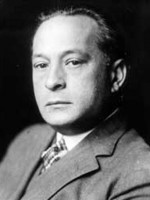Eduard von Winterstein is a Actor Autrichien born on 1 august 1871 at Vienna (Austria)

Eduard Clemens Franz Anna Freiherr von Wangenheim, commonly referred to as Eduard von Winterstein (1 August 1871 – 22 July 1961) was an Austrian film actor who appeared in over one hundred fifty German films during the silent and sound eras. He was also a noted theater actor.
Since 1895, he played at the Schiller Theater which had signed him for a three year contract and from 1898 at the Deutsches Theater in Berlin under Otto Brahm. He married Hedwig Pauly (1866-1965) in 1899. Next he worked at the Lessing theater and acted in Gorky's Nachtasyl at Kleinen Theater. Later he worked under Max Reinhardt. When he moved up Winterstein enthusiastically commented about the country with the following words:
Berlin! It was at that time much more than today, the long-awaited paradise, after each German actor strove with all their might... Here in the big city flourished a lively theater life. The theater almanac from 1895 lists twenty-four theaters for Berlin. [...] I had found temporary accommodation with relatives with my family in the Großbeerenstraße... I was happy that I was just in Berlin to debut in this role (as Tellheim in Minna von Barnhelm)."
He taught acting from 1905 to 1920 at a theater school founded by Max Reinhardt. From 1913, Winterstein also started acting in films. In the period after the Second World War, he worked with the ensemble of the Deutsches Theater. There he played the role of Nathan approximately four hundred times. He won the Best male actor award at the Film Festival in Karlovy Vary for his portrayal of the title role in Die Sonnenbrucks (1951). He soon became a popular German film actor and was cast to play the roles of energetic elders as generals, judges, landlords and directors. He won the national award thrice — for his acting in George C. Klaren-directed Semmelweis - Retter der Mütter (1950), Wolfgang Staudte-directed Der Untertan (1951) and Martin Hellberg-directed Emilia Galotti (1958 film). Unlike the theater, however, Winterstein's appearances were limited in the film mostly on a few scenes. He appeared in 150 films and was the part of various intercom panel discussions, including even in old age the ring story from Nathan the Wise for the East German recording label Eterna. His last film was Der schweigende Stern (1960).
Winterstein deliberately chose a life in the East Germany, a fact which the country's cultural policy took advantage. After his death, the New Germany gave him a special page on which a text winter stone was printed with the title "choice of the better". Its final passage reads:I have experienced a lot of changes: under three emperors, the first world war, the pseudo-democracy of the Second Empire, the Weimar Republic, the terrible twelve years of National Socialism and that induced the complete collapse of the German Empire, until I take sigh of relief from free will and will join the new progressive spirit and am now proud to call a citizen of the German Democratic Republic and this is insight and reason for choosing the better.
A street in Potsdam is named in his honour.
Source : Wikidata
Eduard von Winterstein

Birth name Eduard Clemens Franz von Wangenheim
Nationality Austria
Birth 1 august 1871 at Vienna (Austria)
Death 22 july 1961 (at 89 years) at Berlin (German)
Awards National Prize of East Germany
Nationality Austria
Birth 1 august 1871 at Vienna (Austria)
Death 22 july 1961 (at 89 years) at Berlin (German)
Awards National Prize of East Germany
Biography
Winterstein was born in Vienna on 1 August 1871. His predecessors were the Barons of Wangenheim. He took acting lessons from his mother Luise von Wangenheim-Dub, an actress of Hungarian origin who had played at the Burgtheater in Vienna. Winterstein came to Gera in 1889 and acted in theaters along with his mother and sister Clementine, where he had "undeservedly forgotten" experiences. He acted in the play Ersten Held und Liebhaber in 1893. The same year, he played the title role in Egmont at the opening of a theater in Annaberg on 2 April 1893. "I was re-born in Annaberg and became like a completely different person. In this small town I had really become an actor. [...] So the Anna Berger time was one of the best in my profession." he wrote in his autobiography. At this theater he met the actress Minna Menger, whom he married in 1894. They had a son, Gustav von Wangenheim (1895–1975), who went on to become an actor. The Theater in Annaberg-Buchholz is named Eduard von Winterstein Theater today.Since 1895, he played at the Schiller Theater which had signed him for a three year contract and from 1898 at the Deutsches Theater in Berlin under Otto Brahm. He married Hedwig Pauly (1866-1965) in 1899. Next he worked at the Lessing theater and acted in Gorky's Nachtasyl at Kleinen Theater. Later he worked under Max Reinhardt. When he moved up Winterstein enthusiastically commented about the country with the following words:
Berlin! It was at that time much more than today, the long-awaited paradise, after each German actor strove with all their might... Here in the big city flourished a lively theater life. The theater almanac from 1895 lists twenty-four theaters for Berlin. [...] I had found temporary accommodation with relatives with my family in the Großbeerenstraße... I was happy that I was just in Berlin to debut in this role (as Tellheim in Minna von Barnhelm)."
He taught acting from 1905 to 1920 at a theater school founded by Max Reinhardt. From 1913, Winterstein also started acting in films. In the period after the Second World War, he worked with the ensemble of the Deutsches Theater. There he played the role of Nathan approximately four hundred times. He won the Best male actor award at the Film Festival in Karlovy Vary for his portrayal of the title role in Die Sonnenbrucks (1951). He soon became a popular German film actor and was cast to play the roles of energetic elders as generals, judges, landlords and directors. He won the national award thrice — for his acting in George C. Klaren-directed Semmelweis - Retter der Mütter (1950), Wolfgang Staudte-directed Der Untertan (1951) and Martin Hellberg-directed Emilia Galotti (1958 film). Unlike the theater, however, Winterstein's appearances were limited in the film mostly on a few scenes. He appeared in 150 films and was the part of various intercom panel discussions, including even in old age the ring story from Nathan the Wise for the East German recording label Eterna. His last film was Der schweigende Stern (1960).
Winterstein deliberately chose a life in the East Germany, a fact which the country's cultural policy took advantage. After his death, the New Germany gave him a special page on which a text winter stone was printed with the title "choice of the better". Its final passage reads:I have experienced a lot of changes: under three emperors, the first world war, the pseudo-democracy of the Second Empire, the Weimar Republic, the terrible twelve years of National Socialism and that induced the complete collapse of the German Empire, until I take sigh of relief from free will and will join the new progressive spirit and am now proud to call a citizen of the German Democratic Republic and this is insight and reason for choosing the better.
A street in Potsdam is named in his honour.
Usually with
Filmography of Eduard von Winterstein (82 films)
Actor
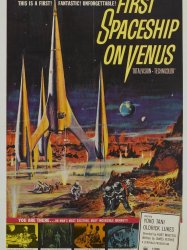
First Spaceship on Venus (1960)
, 1h33Directed by Kurt Maetzig
Origin Pologne
Genres Drama, Science fiction, Adventure
Themes Space adventure films, Films about music and musicians, Films set in the future, Films about extraterrestrial life, Musical films, Space opera, Venus in film, Films about extraterrestrial life, Alien invasions in films, Disaster films
Actors Günther Simon, Eduard von Winterstein, Yoko Tani, Lucyna Winnicka, Ruth Maria Kubitschek
Roles Weimann, Kernphysiker
Rating46%





The film begins in 1985, when engineers involved in an industrial project to irrigate the Gobi Desert accidentally unearth a mysterious and apparently artificial "spool". When found to be made of a material unknown on Earth, the spool is circumstantially linked to the Tunguska explosion of 1908. The "spool" is seized on as evidence that the explosion, originally blamed on a meteor, was actually caused by a spaceship. Professor Harringway deduces the alien craft must have come from Venus. The spool itself is determined to be a flight recorder, and partially decoded by an international team of scientists led by Professor Sikarna and Dr. Tchen Yu. When radio greetings sent to Venus go unanswered, Harringway announces that a journey to Venus is Earth's only alternative. The recently completed Soviet spaceship Cosmostrator I (Kosmokrator in the original), intended to voyage to Mars, is redirected to Venus, a 30–31 day trip. During the voyage, Sikarna works furiously to translate the alien message on the disc using the ship's computer.

Emilia Galotti (1958)
Directed by Martin Hellberg
Genres Drama, Historical
Themes Films based on plays
Actors Karin Hübner, Gerhard Bienert, Maly Delschaft, Eduard von Winterstein, Gisela Uhlen, Günther Ballier
Roles Camillo Rota, Ratgeber
Rating53%






The Sailor’s Song (1958)
, 2h6Directed by Kurt Maetzig, Günter Reisch
Genres Drama, Historical
Themes Seafaring films, Transport films, Political films
Actors Günther Simon, Raimund Schelcher, Ulrich Thein, Hilmar Thate, Siegfried Weiss, Hans Finohr
Roles Hindenburg
Rating62%





As the news of the October Revolution sweep through the world, the German High Seas Fleet's command, wary of a mutiny, decides to send all its ships to a suicide mission in the English Channel. Sailors Albin Köbis and Max Reichpietsch are sentenced to death for political activity. When the socialist sailor Steigert, a member of the firing detail, cannot bring himself to shoot them, he is arrested. On the cruiser Prince Heinrich, Steigert's friends Lenz, Lobke, Kasten and Bartuschek receive Vladimir Lenin's transmit to all of mankind calling for peace. Slowly, the sailors in Kiel — all members of different socialist parties: the Social Democrats, the Independent Socialists and the Spartakists — begin to realize the need for a revolution. The workers and the shipmates rebel against the officers, but the political gaps between them lead the uprising to a failure. In the end, many of the rebel sailors attend the foundation conference of the new Communist Party of Germany.
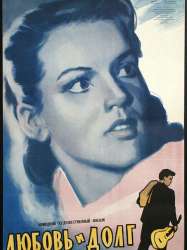
Genesung (1956)
Directed by Konrad Wolf
Genres Drama
Actors Wolfgang Kieling, Eduard von Winterstein, Erika Dunkelmann, Rudolf Ulrich
Roles Professor Beheim
Rating64%






Heimliche Ehen (1956)
, 1h33Directed by Gustav von Wangenheim
Genres Drama, Comedy
Actors Gerd Michael Henneberg, Theo Shall, Armin Mueller-Stahl, Eduard von Winterstein
Roles Hildebrandt
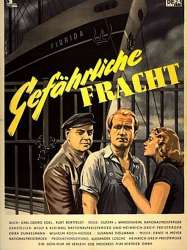
Gefährliche Fracht (1954)
Directed by Gustav von Wangenheim
Genres Drama, Adventure
Actors Erika Dunkelmann, Hannjo Hasse, Eduard von Winterstein, Theo Shall, Kurt Jung-Alsen, Rudolf Ulrich
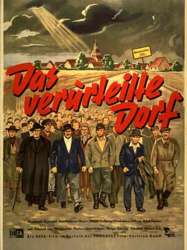
The Condemned Village (1952)
, 1h47Directed by Martin Hellberg
Genres Drama
Actors Helga Göring, Günther Simon, Eduard von Winterstein, Friedrich Gnaß, Wolf Kaiser, Werner Pledath
Roles Dorfpfarrer
Rating62%





Farmer Heinz Weimann returns to his small Bavarian village of Bärenweiler after several years in Soviet captivity. He tells his neighbors, who have been subject to anti-Soviet propaganda disseminated by the Nazis and the Americans, that the Soviets have treated him well. His old sweetheart Käthe has married another man, Fritz Vollmer, but he is not concerned with that. His joy on returning home is interrupted when the mayor announces that the American Army intends to destroy the village and to build an airfield on its lands, in preparation for a confrontation with the Soviet Union.
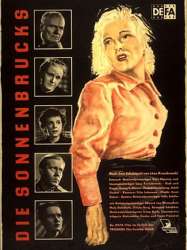
The Sonnenbrucks (1951)
Directed by Georg C. Klaren
Genres Drama
Actors Eduard von Winterstein, Maly Delschaft, Raimund Schelcher, Harry Riebauer, Aleksandra Śląska
Roles Prof. Walter Sonnenbruck
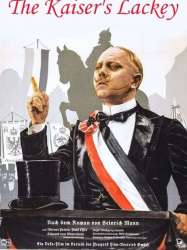
The Kaiser's Lackey (1951)
, 1h49Directed by Wolfgang Staudte
Genres Drama, Comedy, Historical
Actors Werner Peters, Sabine Thalbach, Blandine Ebinger, Carola Braunbock, Ernst Legal, Raimund Schelcher
Roles Buck sen.
Rating72%





Diederich Heßling is a typical Prussian subject of pre-World War I Germany: he is blindly loyal to Kaiser Wilhelm II and deeply admires him, supports extreme nationalist policies and his country's militaristic tradition and claims to be an honorable, just person. In spite of this, he evades military service and uses his connections with government officials to destroy his business rivals. Diederich's life, from his childhood, are characterized by being slavishly subservient to his superiors while tyrannizing those below him.
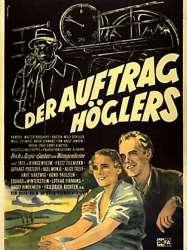
Hoegler's Mission (1950)
, 1h33Directed by Gustav von Wangenheim
Genres Drama
Actors Fritz Tillmann, Alice Treff, Arno Paulsen, Eduard von Winterstein, Reinhard Kolldehoff
Roles Hufland
Högler, the former director of a steel plant now in East Germany, is a rich and ruthless capitalist residing in West Germany. He wishes to lay his hands on the new technical innovations that were developed by Dr. Thelen, who now runs the factory after it has been nationalized. Högler tries to besmirch Thelen by organizing sabotage in the factory, threatening to kill innocent workers to destroy the scientist's reputation. Two trade union activists - the West German Maria and the East German Fritz - who know each other since they have both fought in the wartime anti-Fascist resistance, unite to thwart the capitalist's plans.

Die Jungen vom Kranichsee (1950)
Directed by Arthur Pohl
Genres Drama
Actors Eduard von Winterstein, Maly Delschaft, Werner Pledath, Eduard Bornträger
Roles Schulleiter Buchholz
Rating65%





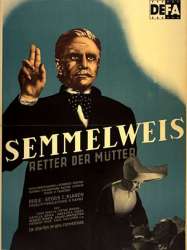
Directed by Georg C. Klaren
Genres Drama
Actors Karl Paryla, Angelika Hauff, Camilla Spira, Erik Schumann, Herbert Hübner, Eduard von Winterstein
Rating62%






Und wieder 48 (1948)
Directed by Gustav von Wangenheim
Genres Drama
Actors Wilhelm Borchert, Josef Sieber, Eduard von Winterstein, Ernst Legal, Paul Bildt, Arthur Schröder
Roles Vater Althaus

La parole est à la défense (1944)
, 1h29Directed by Werner Klingler
Genres Drama, Crime
Actors Heinrich George, Carla Rust, Rudolf Fernau, Eduard von Winterstein, Claus Clausen, Andrews Engelmann
Roles le président
Rating61%






Münchhausen (1943)
, 1h59Directed by Josef von Báky
Origin German
Genres Science fiction, Comedy, Fantasy, Adventure
Themes Space adventure films, Sur la Lune, Space opera
Actors Hans Albers, Wilhelm Bendow, Ilse Werner, Ferdinand Marian, Hans Brausewetter, Brigitte Horney
Roles Vater Münchhausen
Rating69%





The film opens at an 18th-century ball, where Baron Hieronymus von Münchhausen is propositioned by a young woman who is engaged to another man. He graciously rejects her advance, and as she leaves, she asks him to turn on the light. The camera follows his hand to a modern light switch, and the young woman drives off in an automobile. The next day, the Baron, out of his costume and in modern dress, regales two of his guests with stories of the famous Baron Münchhausen, to whom his guests think he is distantly related.
 Connection
Connection



